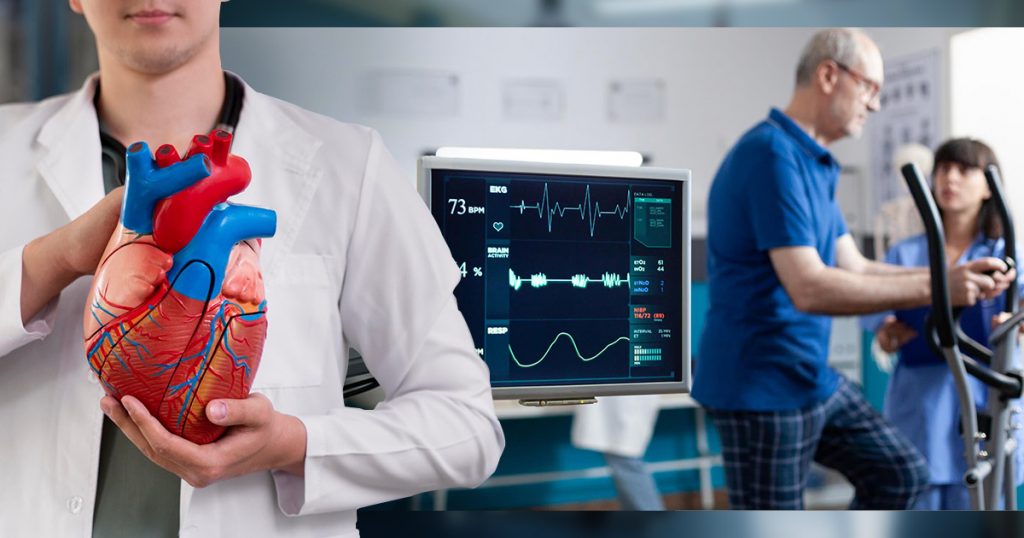Heart health is essential for overall well-being, and a cardiac stress test helps assess how well the heart functions under stress. Several heart stress test types exist, each designed to suit different patient needs. Some involve exercise, while others use medication to simulate physical activity. Understanding what kind of stress tests are there and their purpose can help patients feel more prepared for the procedure.
What Is a Cardiac Stress Test?
A cardiac stress test evaluates how efficiently the heart functions when pushed beyond its resting state. It helps doctors determine if the heart receives enough blood during increased activity. Patients either exercise or take medication that mimics physical activity while medical professionals monitor their heart rate, blood pressure, and electrical activity.
Doctors use this test to:
- Diagnose coronary artery disease
- Identify abnormal heart rhythms
- Guide treatment plans for existing heart conditions
- Assess heart function before surgery
- Evaluate the effectiveness of heart medications
If the heart shows signs of distress during the test, further evaluations may be needed to pinpoint underlying issues.
What Kind of Stress Tests Are There?
Doctors choose from several cardiac stress test types based on a patient’s condition and ability to exercise. The most common types include the treadmill exercise test, stress echocardiogram, pharmacologic stress test, and nuclear stress test.
1. Treadmill Exercise Stress Test
This test assesses how the heart handles increased activity. Patients either walk on a treadmill or cycle while the intensity gradually rises. Electrodes attached to the chest track the heart’s electrical activity while medical staff monitor blood pressure and breathing.
The test progresses until the patient hits a target heart rate or develops symptoms like dizziness, chest discomfort, or unstable blood pressure. Physicians analyze the results to evaluate blood flow and identify potential heart disease.
2. Stress Echocardiogram
A stress echocardiogram combines an ultrasound of the heart with physical exertion or medication. The test begins with a resting echocardiogram, where a sonographer applies gel to the chest and uses a transducer to capture images of the heart’s movement.
After the initial imaging, the patient either exercises or receives medication that simulates exertion. A follow-up echocardiogram captures images to assess how the heart functions both at rest and during exertion. This test helps detect areas of the heart that may not be receiving enough blood.
3. Pharmacologic Stress Test
Patients who cannot exercise may undergo a pharmacologic stress test with an echocardiogram or another imaging method. A medication boosts blood flow to the heart, mimicking the effects of exercise without requiring physical activity.
This test allows doctors to examine how the heart responds to stress without requiring movement. Some patients may experience shortness of breath, flushing, or headaches, similar to actual exertion.
4. Nuclear Stress Test
A nuclear stress test offers detailed visuals of heart blood flow. A mild radioactive tracer is injected, allowing a special camera to capture images before and after stress. This helps doctors pinpoint areas with inadequate oxygen supply. The procedure may take several hours to ensure proper circulation of the tracer.
Preparing for a Cardiac Stress Test
Proper preparation helps ensure accurate test results. Doctors provide specific instructions based on the type of test a patient undergoes.
General Preparation Guidelines
- Wear comfortable, loose-fitting clothes and athletic shoes
- Avoid eating or drinking anything except water for at least four to six hours before the test
- Avoid caffeine for 12 to 24 hours before the procedure
- Refrain from smoking or vaping three hours before the test
- Bring an inhaler if needed and inform technicians about any breathing concerns
Medication Considerations
Certain heart medications, such as beta-blockers and calcium channel blockers, should not be taken before the test unless instructed otherwise. Patients with diabetes may need to adjust insulin or medication schedules and should check blood sugar levels before and after the test. Consulting a doctor about necessary adjustments is essential.
Why Stress Testing Matters
A cardiac stress test is essential for detecting and managing heart conditions. It identifies potential issues early, enabling timely intervention. Doctors use the results to adjust treatments, prescribe medications, and recommend lifestyle changes for better heart health. Understanding the different heart stress test types helps patients make informed decisions. Proper preparation and clear communication of symptoms during the test contribute to accurate results.
